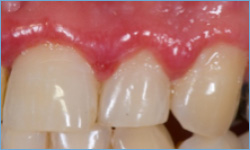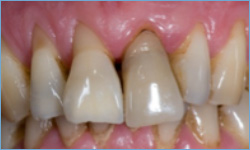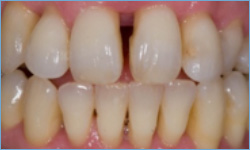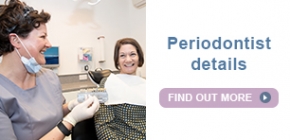How Do I Know I Have Gum Disease
One of the major problems with gum disease is that it rarely hurts, and this can mean that it might go undetected until it is too late.
The simplest approach is to make sure that you have a dentist, who should look at your gums each time you have a check-up. If you are worried, the following are some of the signs that can be significant, but none are absolute, and so, if in doubt, get checked out!”
Patrick Holmes. Clinical Director
Bleeding Gums
Healthy gums don’t bleed. If your hand started to bleed every time you touched something it would be alarming, well the same is true for your gums.
Bleeding is a sign of inflammation of the gums, and while all bleeding gums do not necessarily progress to gum disease, it is a sign of increased risk. The gums might bleed if you brush them, or it can even be that when you eat they bleed. In more severe cases, they can bleed all by themselves.

Swollen Gums
Another sign of inflammation is the gums swelling, The gums can look red and puffy

Longer Teeth
If it looks like the gums have shrunk away from your teeth, this again can happen in gum disease, as it is a sign that there is less bone left around your teeth.
Mobile or loose teeth
Healthy teeth have a fraction of movement in them, but it should be almost unnoticeable. If you can see noticeable movement of your teeth this might be a cause of concern.

Gaps getting bigger between your teeth
When the bone shrinks away from your teeth, they can spread out, and this often results in gaps between them
What can increase my risk of gum disease?
Family history
Genetics can play a strong factor with all diseases, and gum disease is no different. If either, or indeed both of your parents have a history of gum problems you are more likely to have issues. Of course it is not certain, and it might be that you do not follow their susceptibility pattern.
Smoking
If you smoke you are more likely to have deeper pockets around your teeth than if you don’t smoke. If you are able to stop smoking this is obviously ideal, but we recognise that it is very difficult, and, at the moment you might not wish to. We can tailor our approach to offer you more clinical care if needed. There are certain procedures which are unlikely to work if you do continue to smoke, but we would talk you through any potential compromise so that you can make informed decisions
Systemic disease
There are stronger and stronger links between gum disease and other diseases such as diabetes, heart diseases, and stress. These may not cause gum disease, and vice versa, but they are likely to interact, and so it can be worthwhile removing gum disease from the equation by having it treated.







